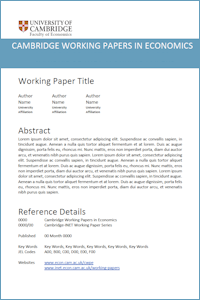
Ogilvie, S., Edwards, J. and Küpker, M.
Economically Relevant Human Capital or Multi-Purpose Consumption Good? Book Ownership in Pre-Modern Württemberg
CWPE1655
Abstract: Human capital is widely regarded as central to economic growth but historical analyses find no causal link between standard literacy indicators and economic development. Book consumption has been proposed as an alternative indicator which has the advantage of measuring economically relevant human capital. We investigate this possibility using individual-level data from a German region between 1610 and 1900. Book ownership was widespread in this society from an early date. But multivariate analysis reveals that the relationship between book ownership and signatures, the standard literacy measure, differed substantially across time-periods, locations, and social groups. Book consumption was associated with other variables – time, gender, urbanization, migration status, and wealth – in ways inconsistent with its having conveyed the “useful knowledge” of industrial and commercial matters emphasized as the way books might have
measured economically relevant human capital. Book consumption is interesting in its own right and casts light on important aspects of the preferences of pre-modern economic agents, but cannot serve as an indicator of human capital for historical analyses of economic growth.
Keywords: economic history, human capital, education, growth, Germany
JEL Codes: N33 E24 J24 O15
Author links:
PDF: https://www.econ.cam.ac.uk/research-files/repec/cam/pdf/cwpe1655.pdf 
Open Access Link: https://doi.org/10.17863/CAM.5874
